Use controls above or click here to open this Hometown Heroes podcast in a new window
Episode #542 of Hometown Heroes, airing September 20-23, 2018 focuses on Pictures for Heroes, with comments from photographer Zach Coco, as well as three of the World War II veterans he has photographed.
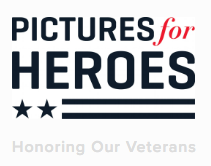
“Pictures for Heroes is a legacy preservation project,” you’ll hear Coco explain. “It started after the death of my grandfather.”
Zach’s grandfather, Anthony Salvatore Coco served on the USS Rushmore (LSD-14), a dock landing ship that participated in four different amphibious landings in the Pacific during World War II. Zach says he learned many important life lessons from his grandpa, but never had the chance to thoroughly discuss his military service.
“After he died, I realized that generation is leaving us pretty quickly,” Zach says. “I wanted to make it my mission to interview and photograph as many World War II veterans as possible to preserve their legacies for future generations to learn from.”
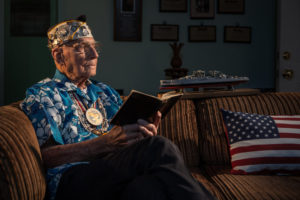
Within the next year, Coco expects to complete a compilation book featuring the photographs and WWII stories of 100 different veterans. You’ll hear excerpts from three of them on this edition of Hometown Heroes, including Pearl Harbor survivor Stu Hedley, who shared his experiences on episodes #475 and #476. If you would like to pre-order the book now, or support Coco’s efforts, visit the Pictures for Heroes gofundme page.
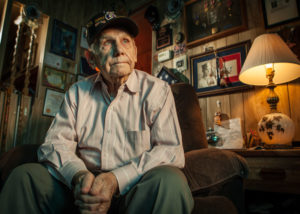
E.T. Roberts survived D-Day on Omaha Beach with the 29th Infantry Division. You’ll hear some of his experiences as well, as originally aired on episode #317 of Hometown Heroes, and he represents another example of how Coco’s efforts with Pictures for Heroes have captured connections to so many of World War II’s most noteworthy moments. Spending time with people who experienced those moments first-hand has deepened the photographer’s understanding of history, and transformed his perspective.
“Some of the tragedies that these guys lived through, specifically the Bataan Death March, I knew nothing about it,” he says, pointing to the example of Sol Schwartz, who passed away in May, 2018.
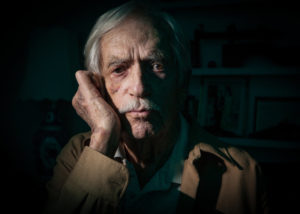
“He came home with no malice in his heart,” Coco says of Schwartz. “To be able to forgive the people that put you through that, it’s very inspiring.”
The story of Lt. Col. Robert Friend holds inspirational value as well. Friend, who detailed some of his experiences on episode #303 of Hometown Heroes in 2014, flew 142 missions in P-51 Mustangs with the 332nd Fighter Group during World War II. He is one America’s last surviving Tuskegee Airmen, African-Americans who dealt with discrimination and segregation at home, while risking their lives for the United States in uniform. Perusing the Pictures for Heroes website with an eye for the diversity of the veterans who united around their common cause will underscore a sentiment voiced by Bob Friend on Hometown Heroes.
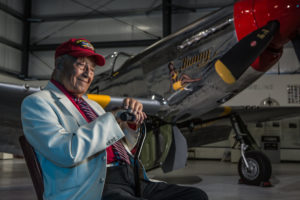
“I’m proud of my heritage,” you’ll hear Friend say. “But I don’t think it should be something that we say ‘African-American, Indian-American, Mexican-American, Latin-American, German-American, Canadian-American.’ Who needs that? You’re either an American or you’re not.”
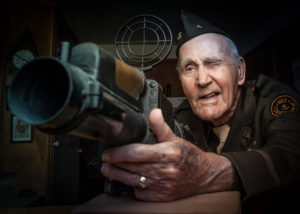
One photo that Coco says holds special meaning for him, is an image of war correspondent Stanley Troutman (left) gazing through the viewfinder of a Japanese machine gun camera. Troutman had a wife and child at home in the U.S. while he was capturing powerful images in the Pacific during World War II.
“He had an entire scrapbook of probably about 100 darkroom prints of his images throughtout the war,” Coco says of Troutman, a fellow photographer seven decades his senior. “I learned of his history, and it just blew my mind.”
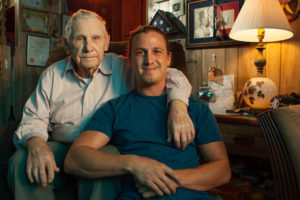
(Pictures for Heroes)
Troutman was among the first journalists to visit Hiroshima and Nagasaki after atomic bombs were dropped on those Japanese cities, and the photos he captured have been viewed by millions of people. Every veteran he meets presents new information Zach Coco knows he couldn’t discover anywhere else, and he says he intends to continue interviewing World War II veterans “until the last one is gone.”
“I’m grateful for the country I love in,” he says. “And for the freedoms I have today because of these men and women.”
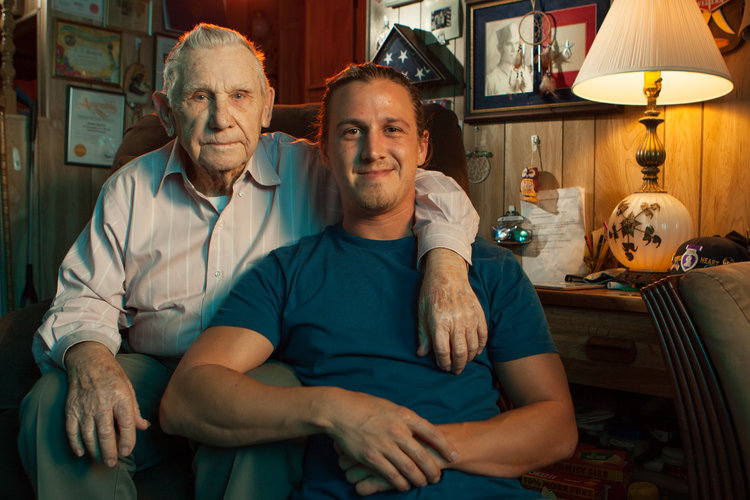
Leave a Reply